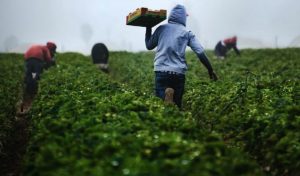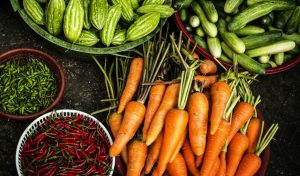Problems Facing Agriculture in Africa: Agriculture is indisputably a veritable tool for economic growth and development as well as job creation in Africa, but significant constraints remain before it can fulfill that potential. A number of challenges beset farmers and governments in their efforts to make a living out of agriculture or exploit agriculture as a means for economic development. Despite the increase in the global population, the number of undernourished people has reduced. However, this positive development was not so obvious in Africa.
Africa has only just started experiencing an improvement in agricultural yields. Unimplemented policies, bad governance, lack of accountability, and debilitated institutions have crippled the efforts of private and public investors in this sector. These are just a few of the problems at the core of growth stagnation of agriculture, the major source of livelihood for many Africans.
To ensure that the greater number of Africans benefit from agriculture and that Africa as a continent witnesses sustainable economic growth, there must be a significant turnaround from the status quo. Investment and modern innovation are of great essence here.
Even so, other factors such as climate change, decline in farm size, and water scarcity are a threat to these expectations. Be it as it may, novel changes in policy, as well as sustainable innovation and investments are being channeled into the agricultural sector.

Recommended: Most Capitalist Countries In The World
Major Problems Facing Agriculture in Africa
The following are some of the problems that pose hindrances to the growth and development of agriculture on the continent. They are:
1. Decline in Farm Size: In recent years, the world has witnessed a pronounced increase in agricultural yields. Less people now go hungry or feed poorly. This favourable development has been attributed to the introduction of advanced technology into agriculture, planting of pest resistant and high yieid crops, and so on. However, for Africa, the slight increase in agricultural yield was mainly thanks to the increase in the size of lands that were cultivated.

Africa accounts for 52% (more than half) of arable lands in the world yet, there are more farmers than farm lands in Africa. Skyrocketing increase in population, urbanization, industrialization, and government development and planning policies lead to increase in demand for land and use of arable land for other non-agricultural purposes. Researchers have predicted that by 2030, 30-60 million hectares of arable land in Africa, would have been converted to other non-agricultural use.
2. Climate Change: Climate change affects agriculture adversely. Extreme and unpredictable weather conditions mean that farmers cannot accurately plan their cultivation schedule and there will be drought as well as tremendous loss of good soil and crops due to flooding and other harmful effects of climate change.
Additionally, as a result of climate change, there could be an increase in the breeding and relocation of crop and animal pests and a drop in the immunity of plants and animals against diseases.
While some of these radical changes can be managed, African farmers who are not so bouyant may not be able to adapt to these changes.
Also see: Causes, Effects and Solutions to Conflict in Africa
3. Water Scarcity: Availability of water is of great consequence in agriculture. No matter the branch of agriculture one is involved in, water is critical for production. Thus, scarcity of water can have far reaching effects for farmers.

Most of the agricultural products that we consume are from rain fed agriculture. A large proportion of lands in Africa witness low rainfall and high evaporation levels. It is expected that by the year, 2050, 66% of the world would experience water scarcity and agriculture would bear the brunt of it because a large portion of fresh water which is used for agriculture would dry up.
4. Access to Finance: Private sector investors have continually lamented the nonavailability of fair and affordable loans and financing schemes for agricultural enterprises in Africa.
Governments of African countries do not set aside enough money in their budgets towards the advancement of agriculture and even when they do, a huge chunk of it is siphoned by unscrupulous politicians.
Also see: Why Democracy is Regarded as the Best System of Government
5. Cross-Sector Collaboration: It has been found that for sustainable development and investments to take place in the agricultural sector, there must be a marriage of the private and public investors. This is not so easy in Africa.

There are no favourable environment provided for private sector and even foreign investors to come into the agricultural sector and do business as they are suffocated by land issues and unfavourable government policies.
6. Infrastructure: With Africa still wallowing in the darkness of intermittent power supply, hazy transportation networks and poor irrigation systems, investors are scared to put in their resources in this sector and farmers work extra hard to get very little yield.
Machines and equipments cannot be fully utilized to increase yieid as there’s no electricity to power them, farm products get spoilt on transit due to slow transportation or lack of preservation facilities and crops dry up whenever there is no rainfall as expected.
Also see: Countries with the Most Handsome Men in the world
7. Skills: Many young Africans view agriculture as a job for the poor. This wrong mindset deter many from seeking a career in agriculture or agric related fields. Hardly anyone chooses agriculture or crop science as a course in institutions of higher learning. Most of those who study these courses do so because they had no other choice and not because they were passionate about agriculture. They’d rather go for more noble courses like law and medicine which are socially recognized to be more lucrative.

Even the uneducated ones are after get-rich-quick schemes and are not interested in soiling their hands. Many farmers have little or no knowledge about advanced farming save for the basic farming knowledge passed down to them from their forebears. Thus, their farms are not well managed, they do not know how to operate the new farm implements and their records are in a mess.
8. Policy: There is a paucity of quality and intentional polices concerning agriculture in many African countries. The laws guiding agriculture in most countries are archaic or borrowed from countries with different climates from the African countries.
Besides, African countries have a tendency to make laws and not enforce them. The few policies made are hardly ever implemented and this has discouraged many foreign and private sector investors and left the agricultural sector of many countries in chaos.
Recommended: Richest Presidents in Africa and their Networth
9. Red Tape: Bureaucracy and inefficient administration in land matters, finance allocation by regulatory bodies have crippled the enthusiasm of many investors and farmers. Land ownership issues have also been a great source of litigation which usually takes a long time for the courts and other tribunals to settle.
Recommended: Hardest food to make in the world
10. Lack of Adequate Research: The lack of proper research and development is a key problem for African agriculture. Many African nations suffer with a lack of access to contemporary farming methods and technology, as well as a lack of investment in agricultural research organisations. The productivity of agriculture and our capacity to adjust to changing environmental circumstances are both hampered by this research gap.

Lack of innovation and the slowly evolving of better crop types, disease-resistant strains, and sustainable agricultural techniques are the effects of inadequate financing for research organisations. Without a strong research environment, African farmers sometimes have to make do with obsolete practises and insufficient information to deal with new problems like climate change and new pests and illnesses.
11. Lack of Adequate Storage Facilities: An important issue in African agriculture is post-harvest losses brought on by insufficient storage facilities. Many farmers throughout the continent struggle to safely store their produced crops. The absence of adequate storage facilities in rural regions, where the majority of African farmers live, frequently results in food rotting, waste, and financial losses.

Since there are no acceptable storage alternatives, farmers are forced to sell their product right away, sometimes at poor rates set by the market. Since farmers are compelled to accept unfavourable pricing owing to the perishable nature of their products, this haste to sell can lead to considerable income discrepancies.
Also see: Causes, Effects and Solutions to Brain Drain in Africa
What’s the Way Forward?
Fortunately, governments in Africa are waking up and rising to the challenges that war against agriculture on the continent. Policies and strategies that encourage private sector investments are being put in place and more attention is paid to development funding for sustainable projects in the agricultural sector.
However, practical steps must be taken by major stakeholders on the continent if the problems enumerated above must be conquered successfully. An Africa where food is plentiful so much so that there is extra that can be exported to generate more income is the goal.

To achieve this aim, the following must be put in place or encouraged:
a. Comprehensive African Agriculture Development Program (CAADP): This is an initiative set up by the African Union (AU) and the New Partnership for Africa’s Development (NEPAD). The establishment of this program by African countries was to make agriculture a primary item on the development agenda so that priority will be given to that sector. CAADP is a program by Africans for Africa.
The program looks to create a synergy between investors from different sectors of the economy. It welcomes the efforts of private and public institutions towards the advancement of the program agenda— agricultural development in Africa.
Its core focus areas are as follows: management of resources which include land, investments in infrastructure development, management of water resources, food supply and preservation, as well as agricultural research and enhancement.
Also see: Causes, Effects and Solutions to Examination Malpractice
b. Agricultural Research and Development: Most of the poor people in Africa are living in the rural areas where they farm or rear livestock for a living. It is no gainsaying that significant improvement in agriculture will translate to a better life for this group of people.
They’d have more employment opportunities, they’d have no need to go find work in the cities, food will be easily accessible and affordable and they can be financially secured.
For all these to happen, there’s need for research. Research paves way for development. It will provide the much needed information about how agriculture is being done in those areas and how it can be improved for the betterment of the lives of those rural people and the larger population.
Agriculture extension and research has proven to work excellently in fast tracking agricultural productivity thus reducing the level of poverty.
Agricultural research is not a cheap endeavor. Governments must show commitment and dedication towards improving how agriculture is done on the continent by earmarking substantial amounts of money in their budgets for agricultural research and ensuring that every cent of these funds is efficiently utilized for the right purposes.
Also see: Advantages and Disadvantages of Mixed farming
c. Improved Accountability and Evaluation/Tracking of Progress on Agricultural Targets: If the major goals for agriculture in Africa must be achieved, there must be in place, a competent system for monitoring and evaluating the progress made in the sector. Information about the effects of the efforts of various stakeholders in the sector must be collated and updated.
Luckily, the CAADP Implementation Strategy and Roadmap, ratified in 2014 by the different heads of state on the continent presents as a veritable tool for achieving this. However, for even better accountability, there’s need for the individual governments of the various countries involved to keep tabs of the progress made and attend to lapses with dispatch.
Also see: How to know someone with low intelligence
d. Multi-Sector Partnership and Collaboration Between Government Ministries and the Private Sector: It has become obvious over the years that public sector or government efforts alone are not sufficient to surmount the problems facing agriculture in Africa. There is thus, a need to bring in the private sector to the discussion table and partner with stakeholders in that sector in order to get better results.
For instance, the National Agriculture and Food and Security Investment Plans (NAFSIPs) should be made with critical attention to public investments which work well with private sector investments to ensure greater development.
Gone are the days when food production is monopolized by the central governments. Dialogue and partnerships with the private sector practitioners in the industry must be brought to the fore and implemented.
Recommended: Richest Musicians in Africa 2024
Conclusion and Recommendations
The recent huge growth in food production that was experienced all over the world was only slightly felt in Africa. The reasons for this is not farfetched: notwithstanding the fact that agriculture is the major source of livelihood for majority of Africans, poor marketability and little or no industrial development has crippled the efforts of farmers on the continent.
In addition to that, the failure or nonexistence of agricultural policies, abiotic and biotic factors, dysfunctional institutions, as well as bad governance have all resulted in the growth stagnation of this most crucial sector of the African economy.
For this current sad story to change, there is need for a radical transformation in the agricultural sector of Africa. Not only will this improve the progress rate of the sector, it will give the sector the necessary push it needs to contribute positively to the development and growth of the African economy as a whole.
There is light at the end of the tunnel. Governments on the continent are taking the bull by the horns in their efforts to salvage the agricultural sector from the slums of stagnation, dust it up and place it where it’s meant to be.
The agricultural sector of many African countries have witnessed a number of meaningful reforms of the laws and policies governing that sector and these legislative changes have directly or indirectly impacted the growth of agriculture positively. There has also been an increase in the quota allocated to agriculture in the budgets of many African countries; agricultural research and development is enjoying more attention and improvements in infrastructure to ensure the smooth running of agricultural businesses on the continent are currently underway. Indeed, the future is green for agriculture in Africa!

Edeh Samuel Chukwuemeka, ACMC, is a lawyer and a certified mediator/conciliator in Nigeria. He is also a developer with knowledge in various programming languages. Samuel is determined to leverage his skills in technology, SEO, and legal practice to revolutionize the legal profession worldwide by creating web and mobile applications that simplify legal research. Sam is also passionate about educating and providing valuable information to people.